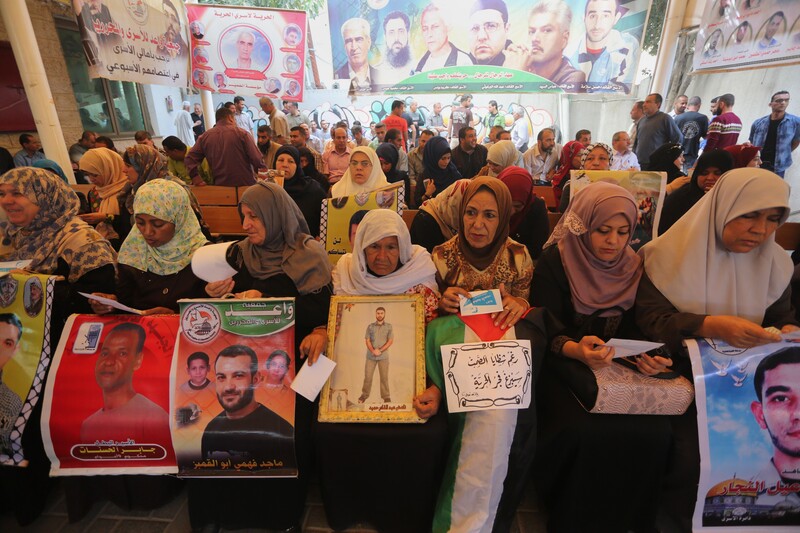Rights and Accountability 11 May 2016

Palestinians take part in a protest demanding the release of prisoners in Israeli jails, in front of the Red Cross office in Gaza City, on 9 May.
APA imagesAfter 69 days of refusing food, Palestinian prisoner Sami Janazreh has suspended his hunger strike for one week, following an Israeli military court’s decision to postpone his appeal hearing for another week.
For the next seven days, according to the Palestinian Prisoners Club, Janazreh will relax his hunger strike to ingest liquids.
Janazreh has twice been sentenced to four months of administrative detention since November 2015.
Under administrative detention, Israel can indefinitely detain someone on the basis of secret evidence that they have no opportunity to challenge through any sort of due process.
Before his scheduled military court hearing on Tuesday, prosecutors submitted supposedly new secret evidence to the court.
The Israeli hospital where Janazreh is held informed the court that Janazreh’s condition is stable enough for the court to postpone his hearing for another week.
Over the next week, the military prosecutors will decide whether to file charges against Janazreh.
The Palestinian Prisoners Club says Janazreh will consider his next step in light of Israel’s ongoing investigation.
Janazreh, 43, is the father of three young children from al-Fawwar refugee camp near Hebron.
Over the last two months on hunger strike, Janazreh’s weight has dropped to about 100 pounds (45 kg), as his body suffers kidney failure and his teeth have begun to fall out.
Ongoing hunger strikes
On Tuesday, Ofer military court upheld the administrative detention of two other Palestinian prisoners who have entered day 39 of their hunger strikes.
Fuad Assi and Adib Muhammad Jamal Mafarjeh have both been refusing food since 2 April.
The two prisoners had been held in solitary confinement at Gilboa and Ashkelon prisons, but were transferred to an Israeli hospital earlier this week, according to the Israel Prison Service.
According to the Palestinian prisoner solidarity network, Samidoun, Mafarjeh has been vomiting blood and is refusing medical examinations by Israeli authorities.
Isolation
In a statement on Tuesday, the Palestinian Prisoners Club noted that Dirar Abu Sisi has now been denied family visits by Israeli prison authorities for five full years.
Abu Sisi was abducted by Israeli agents in 2011, in Ukraine, the country of his wife’s birth.
Accused by Israel of helping Hamas design rockets, he was sentenced to 21 years under a plea bargain. In 2013, Israel promised to allow family visits to Abu Sisi, a father of six, but continues to deny him contact with his wife and children.
Jailing academics
Also on Tuesday, Ofer military court ordered a Palestinian astrophysicist to remain under administrative detention for two months for statements he made on Facebook that were allegedly “inciting against Israeli occupation.”
The arrest of Imad Barghouthi, who turned 54 in prison last month, has garnered outrage from academics around the world, who signed a petition that was delivered to the military court on Tuesday.
In a letter addressed to the European Commissioner for Research, Science and Innovcation, Carlos Moedas, several European academic and human rights organizations wrote that as part of the EU-Israel Association Agreement Israel enjoys access to the European Union’s research and innovation programs on the stipulation that the country “respect[s] human rights and democratic principles.”
The letter argues that the arbitrary arrest of Barghouthi is a violation of that agreement, and urges Moedas to do all he can to secure the scientist’s release.
A physics and astronomy professor at Al-Quds University in Abu Dis, Barghouthi was also detained in 2014 while he was on his way to the United Arab Emirates for a conference, prompting similar international condemnation.
Barghouthi’s 17-year-old daughter, Duha Barghouthi, told Mondoweiss that her father has rejected offers by Israeli academic institutions to participate in joint scientific projects on basis that he “totally rejects scientific normalization. This is part of his peaceful resistance to the occupation.”
Duha suspects Israel’s continued harassment of her father has to do with his rejection of normalization – joint projects that would allow Israel to present itself as helping and cooperating with Palestinians, thus masking the brutal reality of military occupation.
“My father isn’t the only scientist who has been persecuted by the Israeli occupation. There is a war on Palestinian education,” she said.





